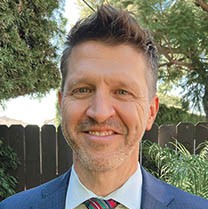 |
According to the CliftonStrengths Assessment, my number one strength is “Harmony,” which means that I generally try to steer myself and others away from confrontation and toward reconciliation. I find the thought of having an enemy to be unappealing, to say the least. More than that, as a Christian, the concept of an enemy (along with its accompanying bad behavior) seems to immediately violate God’s “love your neighbor” principle.
And yet, there are people in our lives with whom we just don’t get along . . . people with whom we are in conflict . . . people who consider you and me to be their enemy. They seemingly make it part of their daily routine to treat us like enemies.
Love your enemies?
Jesus acknowledges the unfortunate reality of such unhealthy relationships, and he tells us, in no uncertain terms, how we are to view such people and conduct ourselves toward them. Contrary to what feels both natural and logical, Jesus challenges us with his command to “love [our] enemies” (Matthew 5:44).
Why? Why should I love my enemies? How can I love those people, especially when they aren’t nice to me or mistreat me because of my Christian faith? If a person treats me poorly because Christ is part of the label I carry, then I might reason that it’s okay to not love—even, hate—those people. After all, if they hate me for being a Christian, then they must also hate Christ, and that’s not okay. Yet, Jesus tells us to love even those maliciously minded people.
It’s not easy. Our natural, sinful tendency is to retaliate in some way. You hurt me, so I’m going to hurt you. We naturally think, Just as you project hate on me, don’t be surprised when I dish out the same in return. The concepts of revenge and retaliation are deeply embedded in our sinful nature and in our culture. People around us expect us to retaliate when we’ve been wronged. It’s how the world and our sinful nature work. Let’s be honest, sometimes my sinful self says, “Ooh, that felt good! Sweet, satisfying revenge!”
But Jesus calls us to be different. Again, why?
The Christian difference
As Christians, we like to remind ourselves that we are in the world, not of the world. We live in this world with every other soul. We experience what everyone around us experiences. We are exposed to the same things. We enjoy many of the same blessings. But we’re different, and it’s a good different. It’s a different the world needs to see and experience.
And it’s more than the simple fact that we carry Christ’s name on our name tag. Christians are different when we reflect Christ’s love even when we are not loved by others. Christians are different when we strive to serve, not to be served. Christians are different when we refuse to seek revenge and retaliation and instead strive to live at peace with everyone (Romans 12:18). Christians are different when we keep no record of wrongs (1 Corinthians 13:5). Christians are different when we swim upstream against culture’s raging current by not repaying evil with evil or insult with insult. Instead we repay evil with blessing (1 Peter 3:9).
Christians are different when we reflect Christ’s love even when we are not loved by others.
But again, why? Why would we want to be different, to love instead of hate? We could oversimplify this, making it entirely law-based, saying, “Because God says so.” And we would be right, but there’s more.
Each and every one of us has inherited our parents’ spiritual DNA, that is, our sinful flesh. That makes us natural born enemies of God (Romans 8:7). And yet, the Lord’s heart is overflowing with an unshakeable love for you, for me, for every single soul. There is absolutely nothing that we could ever do to earn God’s love. And there is nothing we could do to make God love us more than he already does. “As high as the heavens are above the earth, so great is his love for those who fear him” (Psalm 103:11) is a truth that is clearly and beautifully demonstrated in the fact that “while we were still sinners, Christ died for us” (Romans 5:8).
Our Lord Jesus left the incomparable glory of heaven to experience the unfathomable torment of being forsaken by his Father while nailed to a cross. In doing so, he has rescued us from the same solitary sentence. Not only has he rescued us from this horrible fate, but he also has brought us into something so incredibly rewarding: “See what great love the Father has lavished on us, that we should be called children of God” (1 John 3:1). As his children, he does not treat us as our sins deserve (Psalm 103:10). Instead, we are always and only objects of his unconditional and enduring love.
Love as he loves us
To love our enemies, then, is to love as we are loved. It is to refuse to let conflict and tension define a relationship. It is to move beyond the conflict and tension to see those maliciously minded individuals not as hostile opponents, but as troubled, misguided souls. In a sense, we empathetically see them as victims. This isn’t giving people a pass on sin; it’s acknowledging the soul-destroying work that the devil is doing in their hearts.
Remember how Jesus felt about the religious leaders who were his fiercest, most passionate enemies: “[He was] deeply distressed at their stubborn hearts” (Mark 3:5). Remember the tears he shed over the souls of Jerusalem, many of whom would cry out for his crucifixion: “As he approached Jerusalem and saw the city, he wept over it and said, ‘If you . . . had only known on this day what would bring you peace’ ” (Luke 19:41, 42). Remember how Jesus saw and loved the troubled, misguided souls who nailed him to a cross: “Father, forgive them, for they do not know what they are doing” (Luke 23:34).
When we change our perspective to see even a maliciously minded person not as an enemy but as a troubled, misguided soul, we see that person very differently. We no longer see that person as an adversary but as a soul who desperately needs to be cared for and nurtured with the same patience, forgiveness, and love that the Lord shows to us. We see a soul for whom Jesus poured out his blood on a cross. We see a soul with whom our Savior wants to spend eternal life in heaven (1 Timothy 2:3,4). And then, we see ourselves in the unique and privileged position of being the voices and instruments of God to bring grace and peace, hope and joy into the life of a soul darkened by sin.
Why should we love our enemies? To point them to their gracious heavenly Father. To show them the saving love of Jesus. To be an instrument in the hand of God to create an opening for the Holy Spirit to change a heart—for life and for eternity.
Author: Steven Gabb
Volume 109, Number 02
Issue: February 2022
- Please explain: Why is the physical resurrection of Jesus Christ from the dead so important?
- Please explain: Why did God give the Ten Commandments?
- Please explain: Why does the Bible call Satan “the god of this age”?
- Please explain: What sets Old Testament Israel apart from other people?
- Please explain: Why is the virgin birth of Christ important?
- Please explain: Am I really a saint?
- Please explain: What does it mean that “many are invited, but few are chosen”?
- Please explain: How is church discipline a loving practice of the church?
- Please explain: Can a Bible verse be overused or used at an inappropriate time or setting?
- Please explain: What can I do when my relationship with Jesus causes family problems?
- Please explain: What good can possibly come from the persecution of Christians?
- Please explain: What is the Holy Spirit’s role in the life of a Christian?
- Please explain: What does it mean that Jesus’ enemies would become a footstool for his feet?
- Please explain: What do people mean when they say that they have been “born again”?
- Please explain: What does it mean that Christians are priests before God?
- Please explain: If I have been baptized, does that mean I have been anointed?
- Please explain: Can Christians be so heavenly minded that they are of no earthly good?
- Please explain: The world is a mess. Why doesn’t Jesus do something about it?
- Please explain: Why is Holy Communion so important to confessional Lutherans?
- Please explain: What does it mean to give up everything to follow Jesus?
- Please explain: If I worry, am I doubting God?
- Please explain: What is the point of praying?
- Please explain: Where do we get the idea of the Trinity when that word isn’t mentioned in the Bible?
- Please explain: If Jesus is the Good Shepherd, how can he also be the Lamb of God?
- Please explain: What’s the big deal about Easter?
- Please explain: Why should we love our enemies?
- Please explain: Why did Jesus do miracles?
- Please explain: As a Christian, what does it mean to be humble?
- Please explain: What does it mean to have your name written in God’s book?
- Please explain: Is God’s design for marriage relevant in today’s world?
- Please explain: Does God favor certain people?
- Please explain: Why do I so often fail to do what God wants?
- Please explain: Why is the church always talking about money?
- Please explain: How does God’s kingdom grow?
- Please explain: Why are only Christians’ works good, but the same works by others are not?
- Please explain: How do we know that Jesus rose from the dead?
- Please explain: If the Sabbath law no longer applies, why do I have to go to church?
- Please explain: Why did God cruelly command Abraham to sacrifice his son?
- Please explain: Does Christian freedom give me the right to do anything?
- Please explain: Is heaven going to be boring?
- Please explain: Why is Jesus taking so long to return?
- Please explain: Why did Jesus use parables to teach?
- Please explain: Does Jesus build his church on Peter and his successors?
- Please explain: How can I be a Christian when there are so many hypocrites in the church?
- Please explain: Why should I be a Christian when I have to suffer?
- Please explain: How do I know whom to believe now that Jesus is gone?
- Please explain: How can Jesus be our friend if he isn’t physically here on earth?
- Please explain: Why can’t my sister have communion with us?
- Please explain: Whom do we blame for bad things?
- Please explain: Are sins of thought as bad as committing the actual sin?
- Please explain: What makes God unique?







